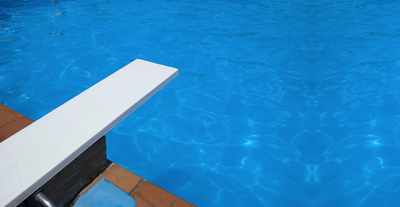Home > Press > Microwave fridges and nano diving boards
 |
Abstract:
NPL scientists are paving the way for highly accurate measurement at the nano-scale and beyond, by being the first team in the world to develop a tiny microwave-powered room-temperature fridge.
Microwave fridges and nano diving boards
UK | Posted on October 8th, 2009This microwave 'fridge' is unlike the one in your kitchen. Rather than chilling pints of milk, it cools tiny devices called 'micro' or 'nano-scale mechanical resonators' to a decidedly frosty -170 ºC. It is important to cool down these devices, which look and behave like tiny diving boards (the simplest type of mechanical resonator, with a well-defined resonant frequency, like a tuning fork), so that they can be measured accurately.
Heat is a killer when trying to make an accurate measurement. Any material that is warmer than absolute zero (-273 ºC) will have atoms moving around inside it, and this makes it very difficult to measure accurately (just as it would be very difficult to weigh a person who was jumping around on the scales).
Now imagine how much easier it would be to weigh the person if they were standing still - this is effectively what NPL has achieved. We have developed a technique that selectively cools down just the property of a sample that needs to be measured. This selective cooling saves an enormous amount of energy, as it means you don't have to waste energy cooling an entire sample when you are only interested in cooling and measuring a tiny fraction of it.
This technique will be of great use in nano-scale and quantum physics as it allows scientists to detect tiny changes in physical factors such as mass, force and displacement by measuring accurately changes in the resonant frequency of the diving board. This means it can be used in applications where highly sensitive detection is needed, such as bio-analytical screening for viruses (by catching a virus on the diving board!). In the longer term this technique could lead to development of even more sensitive 'quantum' diving boards which could be used to examine the really big questions of quantum physics, such as "At what scale do quantum effects break down?".
For more information on this research read 'Excitation, detection, and passive cooling of a micromechanical cantilever using near-field of a microwave resonator', published in the journal Applied Physics Letters 95, 113501 (2009) doi:10.1063/1.3224912 on 16 September 2009.
####
About National Physical Laboratory
As the UK’s National Measurement Institute, NPL’s mission is:
* Excellence in science
* Increased exploitation of that science to boost UK competitiveness and quality of life
* Integrity and independence as a national asset
* Enhanced international standing
For more information, please click here
Contacts:
Dr Ling Hao
Team Time Quantum and Electromagnetics
Phone +44 20 8943 6296
Copyright © National Physical Laboratory
If you have a comment, please Contact us.Issuers of news releases, not 7th Wave, Inc. or Nanotechnology Now, are solely responsible for the accuracy of the content.
| Related News Press |
News and information
![]() Researchers develop molecular qubits that communicate at telecom frequencies October 3rd, 2025
Researchers develop molecular qubits that communicate at telecom frequencies October 3rd, 2025
![]() Next-generation quantum communication October 3rd, 2025
Next-generation quantum communication October 3rd, 2025
![]() "Nanoreactor" cage uses visible light for catalytic and ultra-selective cross-cycloadditions October 3rd, 2025
"Nanoreactor" cage uses visible light for catalytic and ultra-selective cross-cycloadditions October 3rd, 2025
![]() Researchers tackle the memory bottleneck stalling quantum computing October 3rd, 2025
Researchers tackle the memory bottleneck stalling quantum computing October 3rd, 2025
Laboratories
![]() Researchers develop molecular qubits that communicate at telecom frequencies October 3rd, 2025
Researchers develop molecular qubits that communicate at telecom frequencies October 3rd, 2025
Announcements
![]() Rice membrane extracts lithium from brines with greater speed, less waste October 3rd, 2025
Rice membrane extracts lithium from brines with greater speed, less waste October 3rd, 2025
![]() Researchers develop molecular qubits that communicate at telecom frequencies October 3rd, 2025
Researchers develop molecular qubits that communicate at telecom frequencies October 3rd, 2025
![]() Next-generation quantum communication October 3rd, 2025
Next-generation quantum communication October 3rd, 2025
![]() "Nanoreactor" cage uses visible light for catalytic and ultra-selective cross-cycloadditions October 3rd, 2025
"Nanoreactor" cage uses visible light for catalytic and ultra-selective cross-cycloadditions October 3rd, 2025
Quantum nanoscience
![]() ICFO researchers overcome long-standing bottleneck in single photon detection with twisted 2D materials August 8th, 2025
ICFO researchers overcome long-standing bottleneck in single photon detection with twisted 2D materials August 8th, 2025
![]() Programmable electron-induced color router array May 14th, 2025
Programmable electron-induced color router array May 14th, 2025
|
|
||
|
|
||
| The latest news from around the world, FREE | ||
|
|
||
|
|
||
| Premium Products | ||
|
|
||
|
Only the news you want to read!
Learn More |
||
|
|
||
|
Full-service, expert consulting
Learn More |
||
|
|
||








